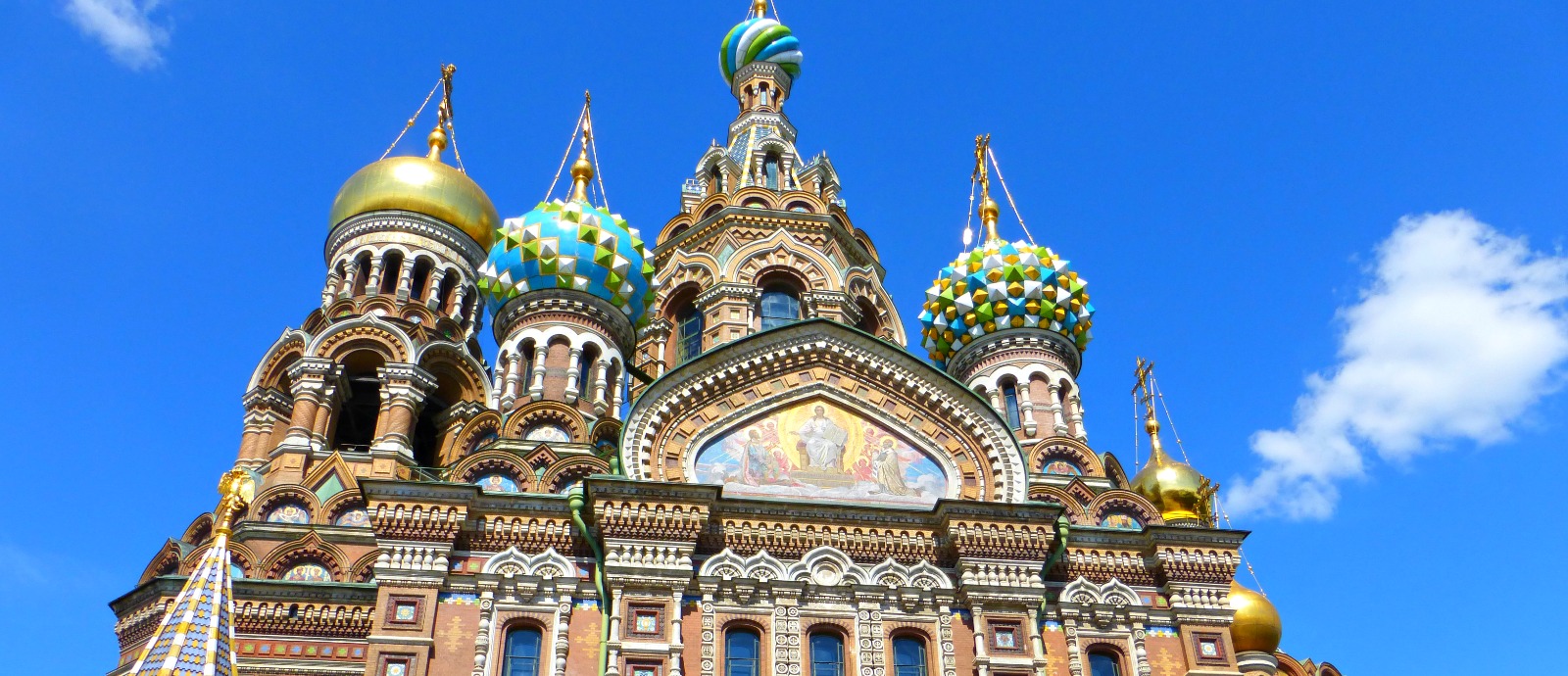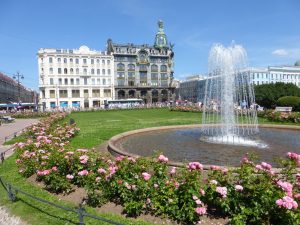by Dan Friesen

In 2007, I led a group of North Americans on a river cruise through Russia, from Moscow to St. Petersburg. We had a delightful experience as we shared the boat with a number of other nationalities, in particular a large group of Danes.
One of the optional evening activities was attending the ballet in beautiful St. Petersburg. The Russians have elevated ballet to a national passion and, in many ways, have set the standard for the rest of the world.
After dinner aboard ship, we road a bus into the city with the Danes. Only about 12 of my group had opted for the ballet and the Danes had a much larger group who boarded first. As a result, we ended up in the back of the bus.
The ride into the center of St. Petersburg was not long, perhaps 30 to 45 minutes. Within 10 to 15 minutes, however, I could feel the tension rising within my group. It was not a warm evening, but it felt stuffy on the bus. I felt it too, but I was not in charge. I had not contracted with the bus company; we had simply purchased the package from the ship and were co-guests on the bus with the Danes.
Yet, I could feel tensions rising at the back of the bus. My Americans were uncomfortable. They repeatedly put their hands up to check the air vents, bewildered as to why the AC was not operating. Feeling the pressure of the rising tension, I dutifully assumed the role of pro-active American tour guide, traipsed past the Danes to the front of the bus, and asked the local guide if she would ask the Russian driver to turn on the air.

As I returned to my seat in the back, I walked facing the Danes. They were much more formally dressed than we were, men wearing jackets and ties, ladies in evening dress and coats. We, meanwhile, wore our cleanest walking clothes with no jackets or accessories. Though dressed in heavier clothing than we were, the Danes showed absolutely no sign of discomfort.
Thus unfolded an intriguing opportunity to compare two different nationalities and cultures going through the same experience at the same time. The Danes had no expectation of climate control and experienced no visible discomfort. The Americans, on the other hand, were almost beside themselves attempting to cope with the suffocating and needless closeness of the air.
I’ve just described “Comfort”, one of the 3Cs Americans combat when traveling abroad.
This story in Russia was part of a presentation made at a walking convention in Salem, Oregon in 2015, an hour-long seminar describing 10 cultural lessons learned while traveling. The lesson about the 3Cs was lesson #6, hence the title of today’s post.
When I began my career in the world of travel in 1992, I had no particularly strong appreciation for history or culture; I looked at the career change to work with my father in his travel business as a lateral move to support our family in a different occupation that looked promising, and more interesting! Furthermore, Dad could be pretty persuasive.
Over the years, a fascination with how things happened (history) and how people live (culture) grew within me. Now, after 30+ years, I still feel like I’m on the outer edge of grasping these seemingly infinite topics, still working my way towards the core.
Much of what I learned about culture in traveling to about 80 countries on all 7 continents resulted from a recalibrated focus forced upon me when challenged in some way by awkward or uncomfortable circumstances (like the uncomfortable expectation to impose American climate control expectations on a bus full of Danes). A couple months ago, I blogged about my 1999 wake-up episode in Italy. During that intense cultural trauma, I was compelled to think hard about the source of and reason for the discomfort. It was a turning point in how I viewed culture and travel.
The most common motive for travel is curiosity about life in other places. Yet this act of simply leaving home removes us from our comfort bubble. Moving and living in a context different than home provides opportunity to see things differently. It can produce that recalibrated focus when challenged or uncomfortable. Almost everything about a travel experience is different than our normal, home-bound patterns. We are forced to abandon an effortless, auto-pilot routine.
As I led our (mostly) American groups around the planet, it slowly dawned upon me that we Americans don’t always benefit from the change in context travel provides. Patterns emerged as I watched other nationalities and reflected on our American responses. Three areas of the American point of view seemed to me to be at the heart of our challenges: Comfort, Control, and Convenience–what I’m calling the 3Cs.
In my opinion, the United States, with all its problems, is the greatest place on the planet and the most successful society in history. Of course, I could be wrong, but from the reading and travel in which I’ve engaged, that is my conclusion to date. Yet there is something sinister embedded in our success. This historic success of the great American experiment begun over 200 years ago has contributed to isolation factors like the following:

- The world’s two largest oceans buffer us both east and west, a result of the concept of “manifest destiny” and our ultimate expansion from sea to shining sea
- The world’s second largest nation is a friendly, English-speaking neighbor to our north, another massive geographic buffer
- All 50 states speak the same language, a huge benefit for a nation of our size and population (imagine the efficiencies gained if all European nations spoke the same language)
- Twin pillars of capitalism and a democratic form of government produced the wealthiest nation in the planet’s history.
- For multiple generations, since World War II, world dominion has been our normal. For better or for worse, the USA has dominated economically, militarily, linguistically, culturally, in just about every way imaginable. A simple test of this is to watch yourself when next you start to communicate in a non-English country. If you are like most of us, you simply expect to be understood when you speak your mother tongue. Yet, when foreigners come to the USA, we expect them to speak English.
The result of these factors is a uniquely American point of view. We are different! We live in a culture of pro-activity; it’s almost part of our DNA. We believe we can affect change, that we should affect change, almost that it is our duty to affect change. It has become natural to see life from a USA-centric frame of reference, but that America-centric point of view forms a barrier to connecting with the cultures of the places we visit.
- Control: We expect things to work and when they don’t, we feel compelled to bring it to someone’s attention. We expect to be heard. After all, the customer is always right. Unlike many cultures, where fatalism can be a shield to circumstances outside one’s control, Americans tend to believe in proactivity. Maybe that’s why we are fascinated with success stories of the come-from-behind underdog.
- Convenience: We are immensely practical. We are often thinking of how to make things better, more convenient, more efficient. We are accustomed to managing circumstances to minimize inconvenience. As a consumer, we expect to be accommodated.
- Comfort: We have been conditioned to resist and remove discomfort. The most conspicuous example of this is climate control, like my St. Petersburg story above. In my experience, we Americans have, by far, the narrowest temperature zone of comfort relative to other people groups–somewhere between 65 and 72 degrees. For multiple generations, we have been conditioned, physically and mentally, to set the thermostat at exactly the temperature at which we feel comfortable, even in our cars! This is not how most of the world thinks and lives.
Be assured, even though I’ve traveled for much of my life, when it comes to the 3Cs, I’m all American. I share this cultural lesson not from a position of judgment but of empathy. Nearly every day I face some level of frustration in my oft-misguided effort to impose my expectations and my will upon foreign travel partners with whom I work. I am constantly busy applying the 3Cs on behalf of my travelers, looking to remove inconvenience and discomfort by asserting my control over circumstances.
Yet one of the most helpful lessons I’m continually confronted with is the value in at least considering when to let go, when to probe more gently (most of the time), when to be more assertive (not nearly as often as I feel like it), and how to enjoy differences in personalities and cultural temperaments.
The WAI Team believes in the transforming potential of travel. We love the idea of creating interactive, experiential travel that challenges travelers. Travel is a powerful antidote to routine and rigid thinking. Much more could be written on this topic, but for today, the one-line summary is:
Cultural Lesson #6: Resist the inbred American proactivity to fix things while traveling.

